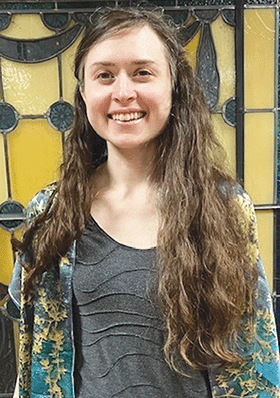By ELANA WARREN / Assistant Editor
Eva Cohen is the first Humanistic rabbi to lead a congregation in Minnesota.
Her great-great-grandfather was a rabbi in Eastern Europe. Now Cohen is a rabbi, but a very different kind of rabbi than her forebear. Rabbi Eva Cohen was recently ordained by the International Institute for Secular Humanistic Judaism — a branch of Judaism that has only been around for about 60 years.

In Cohen’s words, Humanistic Judaism is “an approach to Jewishness that is grounded in what we find meaningful and positive about Jewish culture and history and really affirming human power and responsibility to make a positive difference in the world.”
The religious practice may look conventional — Or Emet, the Minnesota Congregation for Humanistic Judaism, holds Shabbat and High Holiday services — but the Humanistic movement is nontheistic. Humanistic texts don’t invoke God but rather bless and affirm that human power and responsibility.
The Humanistic movement transformed the liturgy to fit that mission. For example, the Shabbat candles blessing that many know as “Blessed are You, Eternal God, Sovereign of the Universe, who makes us holy with mitzvot and commands us to kindle the Sabbath lights” would be said at Or Emet as “Blessed is the light within the world; blessed is the light within each person; blessed is the light of Shabbat.”
Or Emet (Hebrew for “Light of Truth”) hosts monthly Shabbat services and just held an Erev Rosh Hashana service and tashlich. The congregation will also have Kol Nidrei and Yom Kippur services.
“Instead of Kol Nidrei being about promises that we make to God or promises that we make to ourselves, it’s about promises we make to ourselves and promises we make to other people,” Cohen said. Humanistic Judaism shifts the service to have only a human framework.
Humanistic Judaism in Minnesota in the form of Or Emet, which now has around 160 members, in the 1980s, and it affiliated with the Society for Humanistic Judaism in 1988. Co-founder and madrich (spiritual leader) Harold Londer led the congregation until his retirement in 2018. Eva Cohen then became the ritual leader and is now officially the congregation’s first ordained rabbi.
Cohen attended Or Emet as a child with her family and then went on to teach in its Jewish Cultural Sunday School. She became the school’s director, then the congregation’s ritual leader, and now Or Emet’s spiritual leader/rabbi. In this time she also earned a master’s degree in classical and Near Eastern studies from the University of Minnesota in addition to her rabbinic degree.
Now, with her completed training and new title, she hopes to further her impact. Cohen will continue much of the work she was already doing as ritual leader, such as leading services and teaching the “B Mitzah” program. And with her new credentials and free time now that she is out of school, she will be more available to officiate rituals such as baby namings and weddings.
One of Cohen’s main goals as rabbi is to extend her reach. She hopes to raise awareness about Or Emet and Humanistic Judaism and to represent the movement in the broader community. She has started her outreach with interviews with media outlets like the Jewish World, and last month she taught a three-session course titled “Intro to Judaism Through a Humanistic Lens” at the Rondo Community Library in St. Paul.
According to a Pew Research Center study on American Jews in 2020, 22 percent of American Jewish adults “do not believe in any higher power/spiritual force.”
“Humanistic Judaism is uniquely positioned to meet the needs of this population,” Cohen told the Jewish World.
She said she hopes “to introduce secular, unaffiliated folks who may be looking for a Jewish option like this to give them some introduction to the movement and, broadly for some people, to Judaism through a Humanistic frame.”
Cohen would also like to reach into other spaces. She added, “I [want] our congregation and the Humanistic Jewish movement, and secular and cultural Jews, to have a seat at the table, both in terms of the broader Jewish community and the broader secular and Humanistic community, so that we can have our particular concerns and values and priorities represented in all those spaces, along with diverse other constituencies.”
(American Jewish World, October 2024)




















